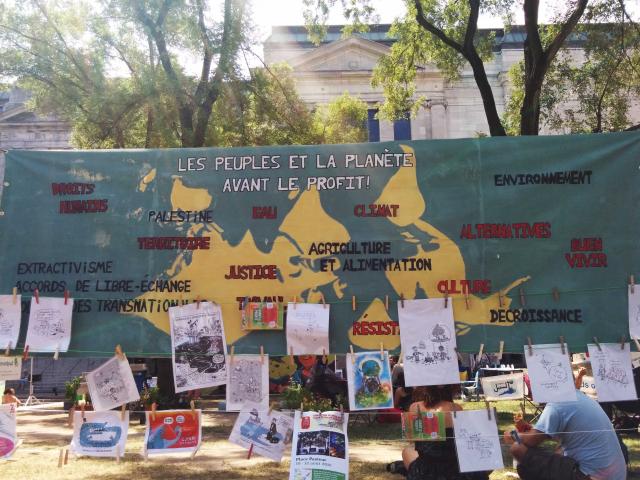Another world is possible: The 2016 World Social Forum in Montreal, QC.

Another world is necessary, urgent, and already in the making.
These are the core beliefs of those who attended the 12th WorldSocial Forum (WSF) - a convergence of solutions, energies, and goodwill for the building of another world.
I attended the WSF (August 9–14, Montreal, QC), and also participated in the World Forum on Theology and Liberation (WFTL), a parallel event organized by local ecumenical organizations and attended by people of faith from around the world. We walked together in the WSF’s opening march in support of solidarity and forward-thinking theology.
The WSF began with some significant challenges for some. This year marks the first time the WSF had been held in a “northern country,” and hundreds of participants (primarily from the global south) were deniedvisas to enter Canada. I heard some criticism of WSF organizers for holding the Forum in the global north in the first place.
However, the location did help focus worldwide attention on Canadian struggles and their global connections. One of the highlights of the WSF for me was a session on resource extraction in Canada and the global south, hosted by United Church partners KAIROSCanada and MiningWatch Canada.
Participants crammed themselves into a standing-room only crowd. The energy in the room was palpable; many attendees had experienced the impacts of extractivism in their own communities. All were eager to hear from these unique voices, as well as share their own lived experiences.
JacindaMack from the Secwepemc and Nuxalk Indigenous peoples in BC spoke about the impact of resource extraction on her home community of Williams Lake, affected by the 2014 tailings spill at MountPolley (one of Canada’s worst mining disasters). Gloria Chicaiza of AcciónEcológica described the harm done by Canadian mining companies in Ecuador. I was struck by the similarities between their experiences.
Afterwards, participants engaged in a lively discussion about local and broader movements that reject the standard idea of development. Resistance needs to be at grassroots level. Would free, prior, and informed consent (as outlined in the UN’s Declarationon the Rights of Indigenous Peoples) be respected and strengthen communities’ power to resist?
Whether north or south, east or west, these are shared problems, for which there are shared solutions and shared energy.
There is much work to do, but there is also much hope. The work of the Spirit often comes to light in solidarity with Indigenous and oppressed peoples, climate justice, and movements for human rights. The WSF is one place where we as people of faith, can join with others to work toward justice, life, and peace.
–Aimee Gavin is Program Assistant and Communications Support for Public Witness at The United Church of Canada.